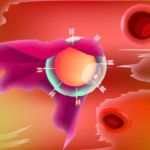Rheumatologists welcome successful outcomes from a large international trial of a cholesterol-lowering drug suitable for statin-intolerant patients.
A large international clinical trial showing bempedoic acid reduced LDL cholesterol by up to 25% is expected to pave the way for an application to the TGA to consider the drug for approval in Australia.
And while Australian experts have welcomed the news as a gamechanger for statin-intolerant patients, they expect statins will remain the first-line treatment for high cholesterol.
The results of the four-year clinical trial involving 14,000 people in 32 countries, including Australia, were presented at the recent American College of Cardiology’s Annual Scientific Session and Expo in New Orleans, and simultaneously published in the NEJM.
The drug, developed and marketed as Nexletol by US-based company Esperion Therapeutics, was approved by the FDA in the US in 2020 for the treatment of adults with heterozygous familial hypercholesterolemia (HeFH) or established atherosclerotic cardiovascular disease (ASCVD) who require additional lowering of LDL cholesterol.
Cardiologist Professor Stephen Nicholls, director of the Victorian Heart Hospital at Monash Health and Monash University’s Victorian Heart Institute, co-led the trial, which included more than 300 Australian participants.
He told Rheumatology Republic there had been massive national interest in the results of the trial. And while it could be a couple of years before the drug is approved and available for use in Australia, it would be a lifeline for patients with high cholesterol who were unable to tolerate statins.
For Dr Jessica Day, a consultant rheumatologist at Royal Melbourne Hospital who also leads translational work in myositis at the Walter and Eliza Hall Institute, the study findings were very welcome.
“This study offers promising news for the significant proportion of patients – 10-15% based on observational studies – who may benefit from statin therapy but experience muscle-related adverse events,” she told Rheumatology Republic.
Results of the trial showed bempedoic acid lowered LDL cholesterol by 20-25%; reduced cardiovascular complications by 13%; reduced heart attacks by 23%; and reduced coronary revascularisations by 19%.
It is estimated that about 2.5 million Australians currently take statins to lower their cholesterol. Professor Nicholls said about 20% of patients on statins had tolerance issues and about 50% of high-risk patients didn’t get their cholesterol down to target levels, so they needed other options.
“This new drug provides another option for lowering cholesterol and is particularly important for patients that cannot tolerate statins,” he said.
“[In clinical practice] that’s a real problem which limits our ability to effectively lower cholesterol in many patients. It has the potential to help between 100,000 and 500,000 people in Australia.’’
Significantly, the drug avoided the muscle-related and high blood sugar adverse effects reported with statin use.
Dr Day told Rheumatology Republic that the exact mechanism behind statin-associated muscle toxicity remains unclear and is likely multifactorial.
“The mevalonate pathway is responsible for LDL synthesis but it is also responsible for critical processes such as intracellular signalling, mitochondrial function and cell membrane integrity,” explained Dr Day.
“While both statins and bempedoic acid inhibit the mevalonate pathway, bempedoic acid appears to have a more liver-specific function and is not activated in muscle or other tissues. This may explain why it appears to be better tolerated in this statin-intolerant cohort,” she said.
“However,” she added, “it is important to note that bempedoic acid may have its own side effects, such as gout.”
Professor Nicholls said he expected the drug to be available for Australian patients in the next two years, depending on the TGA. It is expected to cost more than statins, which have been around for decades and are off-patent.
He said that while he believed statins would remain the first-line treatment for patients with high cholesterol, bempedoic acid would play an important role as an alternative or even a combination therapy with statins.
Of particular interest to rheumatologists, said Dr Day, is the implications of this agent for those patients with anti-HMGCR positive necrotising myopathy, as statins are strictly contraindicated in this disease.
“In patients on statins, we see a paradoxical upregulation of cellular HMGCR, which is thought to drive the abnormal immune response in patients with anti-HMGCR positive necrotising myopathy,” said Dr Day.
“Bempedoic acid targets the mevalonate pathway upstream of HMGCR which may mean this form of cholesterol-lowering therapy is safe in patients with this particular form of myositis – although further data are needed,” she said.
Professor Nicholls said there were more therapies in research and trials to treat cholesterol, including tablets, injectables, gene therapy, and even vaccines.
“It’s a really exciting time in this space,” he said.
“The gene editing is already in clinical trials. We’ve seen patients enrolled in New Zealand and in the UK, and we’re hopeful that those technologies will probably come to trials in Australia, hopefully, in the next 12 to 24 months or so.
“So there’s going to be so many options to treat cholesterol. Patients will have choice. It will come down to how you want to administer it. Some people will want to take a tablet ever day, some people are pretty happy to have an injection once a month or a couple of times a year.
“What the gene editing looks like remains to be seen, but in theory that would be a once-in-a-lifetime treatment but it’s probably going to be expensive. When I think where we may be in 10 to 15 years from now, it’s pretty exciting – for patients and for clinicians.”
The Heart Foundation’s chief medical officer Professor Garry Jennings told RR that while the research didn’t directly compare the bempedoic acid with statins, the results were promising and the drug appeared to be “pretty safe”.
He said that while statin intolerance was “probably over-rated”, it was good to see that bempedoic acid did not appear to be linked to the muscle problems that often deterred patients from taking statins.
“There’s some light on the horizon for people who can’t take statins but need their cholesterol maintained,” he said.
Esperion Therapeutics has been contacted for comment.
Additional reporting by Karina Bray.





